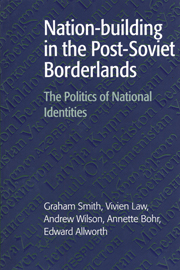Book contents
- Frontmatter
- Contents
- List of figures
- List of tables
- Preface
- The post-Soviet borderland states
- 1 Post-colonialism and borderland identities
- Part I Rediscovering national histories
- Part II Ethnopolitics and the construction of group boundaries
- Part III Language and nation-building
- 8 Language myths and the discourse of nation-building in Georgia
- 9 Language policy and ethnic relations in Uzbekistan
- Notes
- Index
9 - Language policy and ethnic relations in Uzbekistan
Published online by Cambridge University Press: 01 June 2011
- Frontmatter
- Contents
- List of figures
- List of tables
- Preface
- The post-Soviet borderland states
- 1 Post-colonialism and borderland identities
- Part I Rediscovering national histories
- Part II Ethnopolitics and the construction of group boundaries
- Part III Language and nation-building
- 8 Language myths and the discourse of nation-building in Georgia
- 9 Language policy and ethnic relations in Uzbekistan
- Notes
- Index
Summary
As elsewhere in the Soviet borderland states, an important watershed in the nation-building process in Uzbekistan was the adoption in October 1989 of the law ‘On the State Language’, which granted Uzbek the status of the sole state language within the Uzbek Soviet Socialist Republic. Lying at the heart of the new language politics were issues of power and status rather than communication, for, as Donald Horowitz has pointed out, language is a potent symbol of both new-found group dignity and status. Although the new law made Russian the ‘language of inter-ethnic communication’, it also required employees in the state sector as well as those serving the population to command enough Uzbek for the fulfilment of job responsibilities. Owing to material and organisational constraints, however, the pace of implementation of language legislation inevitably slowed. In December 1995, more than six years after the passage of the original legislation, a revised version of the Law on the State Language was adopted. The revised edition no longer made knowledge of Uzbek compulsory for public sector employees, yet it also abolished Russian's special status, putting that medium on a par with all other ‘foreign’ languages.
This chapter examines language policy in Uzbekistan and assesses how legislation has reconstituted ethnic relations between the titular group and key non-titular minorities. The first part outlines the general evolution of language policy in Uzbekistan since 1989, comparing the significant ways in which the first edition of the language law diverges from the revised edition.
- Type
- Chapter
- Information
- Nation-building in the Post-Soviet BorderlandsThe Politics of National Identities, pp. 197 - 223Publisher: Cambridge University PressPrint publication year: 1998



